Kristin Halbrook's Blog, page 6
July 25, 2011
Big News and a Celebration!
I learned about it in May and have kept it a bit under the radar, but now I'm super excited to be able to share my news with you!:
July 25, 2011
 Children's:
Children's:
Young Adult Kristin Halbrook's debut WILL AND ZOE, featuring two teenagers who, in search of a better life, run away to Vegas, but realize they can't run fast enough when they end up wanted by the police, out of money, and out of options, pitched as a YA Bonnie and Clyde, to Sarah Dotts Barley at Harper Children's, in a two-book deal, in a very nice deal, by Suzie Townsend at FinePrint Literary Management.
The journey to publication has been amazing and educational and affirming and tough and unpredictable so far, and I know it will continue to be all kinds of hard work and joy and amazement. To celebrate the sale, I'm giving away some books from my favorite people! Five winners total, one book each:

*One signed copy of The DUFF, by Kody Keplinger**One signed copy of Like Mandarin, by Kirsten Hubbard* *One ARC of Ashes, by Ilsa J. Bick**One signed ARC of Ripple, by Mandy Hubbard**One copy of Entwined by Heather Dixon*
To enter, make a comment on this post telling me what pop culture legend - like Bonnie and Clyde - you think would be amazing as a YA novel. That's it! For an extra entry, tweet this contest and link the tweet in your comment. I'm sorry to exclude my wonderful overseas friends, but contest is open in the U.S. and Canada only. Contest closes on Thursday, August 4th.
~*~*~*~*~*~*~*Squeeeeeeeeeeeeeeeeeeeeeeeee!!!!!!!!!!!!!!!!!!~*~*~*~*~*~*~*~*
July 25, 2011

 Children's:
Children's:Young Adult Kristin Halbrook's debut WILL AND ZOE, featuring two teenagers who, in search of a better life, run away to Vegas, but realize they can't run fast enough when they end up wanted by the police, out of money, and out of options, pitched as a YA Bonnie and Clyde, to Sarah Dotts Barley at Harper Children's, in a two-book deal, in a very nice deal, by Suzie Townsend at FinePrint Literary Management.
The journey to publication has been amazing and educational and affirming and tough and unpredictable so far, and I know it will continue to be all kinds of hard work and joy and amazement. To celebrate the sale, I'm giving away some books from my favorite people! Five winners total, one book each:

*One signed copy of The DUFF, by Kody Keplinger**One signed copy of Like Mandarin, by Kirsten Hubbard* *One ARC of Ashes, by Ilsa J. Bick**One signed ARC of Ripple, by Mandy Hubbard**One copy of Entwined by Heather Dixon*
To enter, make a comment on this post telling me what pop culture legend - like Bonnie and Clyde - you think would be amazing as a YA novel. That's it! For an extra entry, tweet this contest and link the tweet in your comment. I'm sorry to exclude my wonderful overseas friends, but contest is open in the U.S. and Canada only. Contest closes on Thursday, August 4th.
~*~*~*~*~*~*~*Squeeeeeeeeeeeeeeeeeeeeeeeee!!!!!!!!!!!!!!!!!!~*~*~*~*~*~*~*~*
Published on July 25, 2011 07:19
May 18, 2011
Road Trip Wednesday: My Writing Goal Rewards
I'm a fan of setting goals. And not just in my head. I actually have a Life Goals scrapbook full of blank pages (and some completed pages) with goals written across the top. I love dreaming, and perhaps the only thing I love more than the dreaming is figuring out the steps to making those dreams come true.
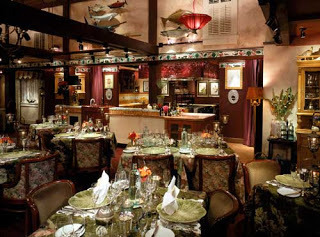 The Herbfarm's dining room.At the end of each set goal, I allow myself a reward. Sometimes meeting the goal in and of itself is the reward, while other times there's an additional perk I allow myself when I feel like I worked hard or achieved something important to me.
The Herbfarm's dining room.At the end of each set goal, I allow myself a reward. Sometimes meeting the goal in and of itself is the reward, while other times there's an additional perk I allow myself when I feel like I worked hard or achieved something important to me.
With writing, my rewards tend to be simple and intuitive. If I met my word count for the day, my goal is nothing more than going to bed with a clean conscience. That's definitely worth something! But I do have one big goal set aside for that fated day I (hopefully!) Sell The Book.
And it's all about the food.
When I sell, I'm going here. The Herbfarm. Home of the nine course, seasonal, themed menu, one dinner seating per night and a celebration of all edibles Northwest. I've been dying to go for donkers years, but I won't allow myself the pleasure until I reach that ultimate publishing dream. Until then, I'll gaze longingly at the themes (Copper River Salmon! The Great Northwest Barbecue! The Uber Tuber!) in between meeting those daily word counts.
What are your writing rewards? Check out YAHighway to play along with our Road Trip Wednesday.
 The Herbfarm's dining room.At the end of each set goal, I allow myself a reward. Sometimes meeting the goal in and of itself is the reward, while other times there's an additional perk I allow myself when I feel like I worked hard or achieved something important to me.
The Herbfarm's dining room.At the end of each set goal, I allow myself a reward. Sometimes meeting the goal in and of itself is the reward, while other times there's an additional perk I allow myself when I feel like I worked hard or achieved something important to me.With writing, my rewards tend to be simple and intuitive. If I met my word count for the day, my goal is nothing more than going to bed with a clean conscience. That's definitely worth something! But I do have one big goal set aside for that fated day I (hopefully!) Sell The Book.
And it's all about the food.
When I sell, I'm going here. The Herbfarm. Home of the nine course, seasonal, themed menu, one dinner seating per night and a celebration of all edibles Northwest. I've been dying to go for donkers years, but I won't allow myself the pleasure until I reach that ultimate publishing dream. Until then, I'll gaze longingly at the themes (Copper River Salmon! The Great Northwest Barbecue! The Uber Tuber!) in between meeting those daily word counts.
What are your writing rewards? Check out YAHighway to play along with our Road Trip Wednesday.
Published on May 18, 2011 00:09
March 22, 2011
File Under . . .
. . . Sightings of Supreme Awesomeness at One of the Best Bookstores EVER (the University Bookstore in Seattle, for those not in the know)!
 Magical rainbow of book brilliance.
Magical rainbow of book brilliance.
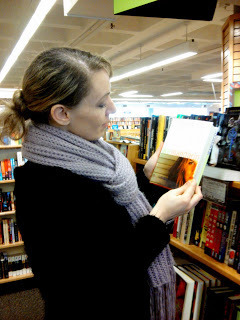 Huh, *this* books looks pretty damn awesome. I think . . . yes, yes, I'm going to BUY it!Do you have YOUR copy of Kirsten Hubbard's Like Mandarin, yet?
Huh, *this* books looks pretty damn awesome. I think . . . yes, yes, I'm going to BUY it!Do you have YOUR copy of Kirsten Hubbard's Like Mandarin, yet?
 Magical rainbow of book brilliance.
Magical rainbow of book brilliance. Huh, *this* books looks pretty damn awesome. I think . . . yes, yes, I'm going to BUY it!Do you have YOUR copy of Kirsten Hubbard's Like Mandarin, yet?
Huh, *this* books looks pretty damn awesome. I think . . . yes, yes, I'm going to BUY it!Do you have YOUR copy of Kirsten Hubbard's Like Mandarin, yet?
Published on March 22, 2011 20:34
March 14, 2011
On Choosing Your Food
This video struck me for a number of reasons: Food politics are an issue very close to my heart, homeschooling is an issues very close to my heart, and awesome teens (pre, in this case!) are very close to my heart. I think he presents his material in a concise, easy to understand manner. And really, how many adults would be terrified to give that presentation? Kudos to you, Birke!

Published on March 14, 2011 12:16
March 9, 2011
Road Trip Wednesday: I Would Do Anything . . .
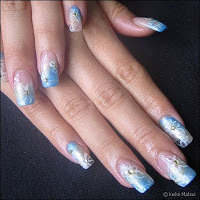 something like thisTime for another RTW and this one's a *special* one! We're celebrating the release of the fantabulous Kirsten Hubbard's book LIKE MANDARIN with a Grace and Mandarin-themed topic:
something like thisTime for another RTW and this one's a *special* one! We're celebrating the release of the fantabulous Kirsten Hubbard's book LIKE MANDARIN with a Grace and Mandarin-themed topic:I would have given anything to be like . . .
While many have said one of the things that drew them into the story was how well they could relate to Grace's adoration of Mandarin, I found the opposite to be true. I've never had an intense experience wanting to emulate someone and so reading the novel opened a beautiful (and beautifully crafted) world to me.
I did have a life-changing moment in middle school, thanks to a friend of mine, that helped me determine what kind of person I wanted to be. It's such a simple story, but sometimes the most simple are also the most profound.
My friend came to school one day with a new set of artificial nails. They were pale blue with white swirls airbrushed on the them and so pretty! I didn't envy the nails (I had to keep mine short for sports and violin and that didn't bother me) but I did admire them. And told her so.
And she simply said "Thank you."
*earthquake*
It really was a revelation. At that time it was important to volley a compliment someone had paid you or exhibit huge shows of false modesty to make sure you didn't come off as stuck-up or a know-it-all. I played along with that, even though it seemed dumb to me. But the amazing feeling that *I* got when she said thank you changed how I would play along in the future. It was so nice to have a compliment received well that I wanted to give that to others.
I try to encourage others to be confident, to not hide talents or awesomeness, even in a social culture that doesn't approve of pride or boasting. I feel confident myself, and could never let anything anyone said or did change that, thanks to that one moment when I promised myself I would be like my friend.
Want to play along? Visit YA Highway and leave your blog post link in the comments.
Published on March 09, 2011 14:48
February 16, 2011
Auschwitz-Birkenau
My mom recently called me up. She'd been talking with one of the teachers at her school who was teaching a WWII unit and mentioned my recent trip to Europe and, specifically, my visit to Auschwitz and Birkenau Concentration Camps. The teacher requested I come in and talk to her students, but I wasn't able to schedule a time in the two weeks left of their unit. Instead, I wrote about my experience. At least, as much as I could write about it. Nearly two months after being at the camps, I still find it difficult to put my experience it words. There is much I can't convey in a truthful, meaningful way. Here is what I am able to say:
Auschwitz-Birkenau, December, 28, 2010
When I told people I was going to Auschwitz, they gave me a look.
"You're not Jewish."
"You're not German."
"You're not going to go there . . . alone . . . at Christmastime?"
I just nodded, nodded, "Yes, I'll be in Krakow. I need to go. I can't not go."
Three days after Christmas, I woke earlier than most at my hostel and dressed in the sliver of winter light peeking through the slit in the curtains. It had been cold in Krakow, in all of Europe, with nearly every day seeing at least a short snow flurry adding to the dirty slush in gutters and sidewalk corners. I sat in the empty hostel kitchen and ate a piece of toast and cup of tea and read the humorous captions on the beer posters on the wall.
My breath created a cloud of steam like a cartoon dialogue bubble as I walked across Stare Miasto, Krakow's old town square. I stepped gingerly, having watched a girl slip on the inch thick ice over the square's cobblestones the day before. To my left, the Cloth Hall was coming alive with vendors and their amber jewelry and dragon keychains and stuffed animals.*
We were told to get there fifteen minutes early, but I got to the tour office two minutes early and ended up behind a large group embroiled in an argument with the clerk at the desk.
Please don't make me miss the bus, I thought. I can't always be this prepared to go.
I finally got my ticket validated and scurried outside to meet the bus just as it was closing its doors. I found an empty seat, prepared to put some music on and drown out the sounds of the bus. But the tour organizer stood and talked to us about the drive, about how long it would take, about how we should make sure to get lunch at the Auschwitz visitor's center if we were doing the salt mine tour in the afternoon (as I was).
She smiled like a tour organizer should smile. I couldn't quite understand it. She knew where we were going, after all.
We watched a video about the liberation of the concentration camps on the way to the countryside. It was the sort of thing you might be shown in school: safe black and white footage, a couple of soldier interviews. It mirrored the most I'd seen about the camps at that point. I watched most of it, but sometimes I stared out the window at the thick layer of snow blanketing sleeping fields.
When we reached Auschwitz, I exited the bus and was stunned by how cold it was. It was worse than any place I'd been so far on my trip: colder than the windy east coast of Scotland, colder than the misty German castle on the hill, colder than standing on the banks of the Danube in Budapest.
I rushed into the warm visitor's center and huddled in a corner near the heater until my tour group was ushered back outside again to be sorted into language groups. The Italians headed off with a short man with a mustache. The French with a thin woman who talked at a body-cringing decibel, even though she had a mic synched to her group's headphones.
Half of the English-speakers headed off with the tour operator. My group was paired up with another guide. He was a Polish man, tall and sturdy, with a simple, round face, North Face jacket and ski cap. When he spoke, I turned up the volume on my headset. Despite his size, his voice was soft, gentle, consumed with reverence for his work, for the history he shared with us. I was in awe of his demeanor, of the way he settled my nerves, and grateful to not have the French woman.*
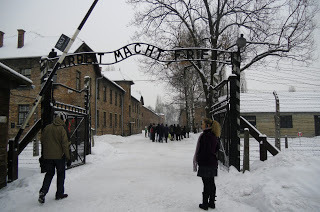 We began at the entrance.
We began at the entrance.
Work Will Set You Free.
It's what the wrought iron sign says over the entrance to Auschwitz Concentration Camp, but in German. Last year, someone stole the original sign and it's not yet been recovered. The new sign is an exact replica and holds the same meaning, the same ironic horror as the original. We passed under the sign and, except for the ten-feet-tall barbed wire around the perimeter, it looked like a hospital or school campus.
But it smells like death.
I was not prepared for the smell that lingers at Auschwitz. It was gray and char and dust and old and bones. It smelled like bodies and it smelled like despair. Almost two months later, whenever I look at the few pictures I took at Auschwitz I can still smell the Death Camp.
We walked toward the back of the camp. It was smaller than I'd imagined, considering the millions who suffered there. When our guide told us how thousands of people lived in each barrack at one time, I was unable to comprehend the logistics of that many people in that little space.
At first, the Jews and other groups (gypsies, handicapped, political prisoners) who were brought to the camps were told they were simply being relocated. In some places, Greece for example, the propaganda was laid on so thickly that Jews there would sell all their possessions to buy a train ticket to Poland. They wanted to go. They turned their lives upside down and rid themselves of everything they'd worked for save a few precious items because they'd been told these camps were the new Promised Land. In a world such as ours where social media has made it nearly impossible to not be informed, to not have an opinion on every side of every issue available at the touch of my fingertips, I could hardly grasp the concept that propaganda could distort so completely. By this time, many people in Germany and Poland knew about the systematic murders at the camps. But in other countries, they thought the camps meant freedom. One display at the camp showed the tickets murdered Jews had purchased with their own money. It was monstrous.
I was freezing.
My stomach hurt. I was clenching it because of the bitter cold, I was clenching it because of the smell, because of the stories that were brought to life right in front of me.
I was glad I'd only had toast and tea a couple hours before.
We wove in and out of several buildings. Our guide narrated in that soft voice of his and I felt like a wispy cloud of history had settled over me. I read the names under the head shots of prisoners lining the walls. I read their dates: birthdate, death date. I spent too much time calculating how old each person was when they died and fell to the back of the tour line. It was slightly warmer inside the buildings than out, and I lingered next to maps of the Nazi camp system, beside doors to "washrooms" with little more than a sink and a hole in the ground.
The smell was still there and photos lining the walls narrated the events at the camp. Faces stared back at me. I felt nauseous and I thought longingly of the warm visitor's center.
I almost turned around and walked back.
Our guide told us a story about a 12-year-old girl who had to stand barefoot outside for 24 hours in the middle of the winter as a routine punishment and I didn't stop feeling the cold and the ill and the sorrow, but I also couldn't go back.
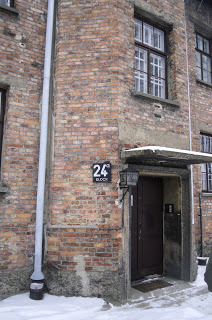 It's hard to visualize millions of people. Millions of possessions, millions of dreams, millions of loves. In the next buildings, we walked past displays of items: suitcases stamped with names and cities and countries, toothbrushes and teeth, hairbrushes, clothing, shoes. Some prisoners were employed in separating all the items the new prisoners brought with them when they arrived, all the items that were taken from them by the Nazis. The items were resold to people outside the camp. Valuable metals were melted down and used to pay for the war.
It's hard to visualize millions of people. Millions of possessions, millions of dreams, millions of loves. In the next buildings, we walked past displays of items: suitcases stamped with names and cities and countries, toothbrushes and teeth, hairbrushes, clothing, shoes. Some prisoners were employed in separating all the items the new prisoners brought with them when they arrived, all the items that were taken from them by the Nazis. The items were resold to people outside the camp. Valuable metals were melted down and used to pay for the war.
Heads were shaved.
I never knew when to take photos at the camp, unsure that there was a right time or place, so I only have a few. But there is only one place at Auschwitz where visitors are not allowed to take photos at all. In that room, behind a thick wall of glass, is a mountain of hair. It is a brown mass stretching across a 20-foot room, a foot or more taller than I am. The hair does not move in the least, but it is alive.
On the opposite side of the room, we saw what the hair was used for: wigs, clothing fabric, mattresses. People wore and slept on the hair of the murdered.
Soon after, we visited a room with the items that were brought for children. Dresses for babies, tiny silver hairbrushes, leather shoes that could fit in my palm. There was a picture of two boys on a wall nearby. They have just gotten off the train at the concentration camp and are holding hands, grinning, skipping. Literally on the pathway to their death.
I stared out a window at the brick wall of the next barracks over and cried.
When I finally caught up with my tour group outside, my face stung under the tears and elements.
We walked past the wall where shooting executions were carried out, past the post where public hangings were carried out. Entered the crematoriums.
They were so small. We learned that one of the reasons nearby Birkenau was built was because the Nazis needed bigger ovens. Surprisingly, it seemed to smell less like death here than at other parts of the camp. Or maybe I'd just become so numb by that point I couldn't smell it anymore.
We returned to the visitor's center, where the tour organizer encouraged us to get something to eat again. There was a black hole in my belly I didn't know how to fill. Food, taste, enjoyment, life felt disrespectful.
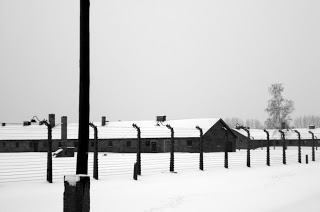 We boarded the bus for the short drive to Birkenau Death Camp. Auschwitz seemed a luxury compared to the dirt floors and shoddily constructed wooden barracks at Birkenau. Here, there was no difference between the outside and inside temperature. The wind cut through gaps in the walls and roofs. I couldn't stop shivering in my layers of shirt, sweater, coat, boots. The prisoners worn one layer of thin fabric during these same winter months. When our tour guide told us about how many people slept in each barracks and we saw the stacks of pallets four and five high with nothing more than a bit of hay to sleep on, we thought it must have been a blessing to be squished in with five or six other bodies, if just for the warmth.
We boarded the bus for the short drive to Birkenau Death Camp. Auschwitz seemed a luxury compared to the dirt floors and shoddily constructed wooden barracks at Birkenau. Here, there was no difference between the outside and inside temperature. The wind cut through gaps in the walls and roofs. I couldn't stop shivering in my layers of shirt, sweater, coat, boots. The prisoners worn one layer of thin fabric during these same winter months. When our tour guide told us about how many people slept in each barracks and we saw the stacks of pallets four and five high with nothing more than a bit of hay to sleep on, we thought it must have been a blessing to be squished in with five or six other bodies, if just for the warmth.
We walked down a wide, stark outdoor corridor, train tracks to our right. At the end of the line was one train car.
I had learned about how prisoners were sorted as they arrived at the camps. How there were two lines: one for the healthy and able and one for everyone else. The everyone else line usually included women, the elderly, and children under about ten years of age. I thought about my eight- and three-year-old girls back home. About how able and sturdy I was. It was difficult not to put myself in that place and time as I stared at the one train car. Difficult not to imagine how I might have been put in the line to work, how my children would have been taken from me to immediate death.
Maybe it's me, maybe we all would feel the same way at the beginning of the tour: that we would have hoped to have been a survivor, that we would have hoped to have been liberated, to have seen freedom, maybe even to have seen revenge one day.
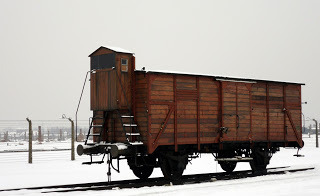 But life in the camps was hell. It was cold. It was lonesome, it was deadly. By the end, I'd begun to hope that, had I been there, had I been put on that train and stood before an evaluator to be judged left line or right line, that whoever was deciding my fate would have been merciful enough to give swift death.
But life in the camps was hell. It was cold. It was lonesome, it was deadly. By the end, I'd begun to hope that, had I been there, had I been put on that train and stood before an evaluator to be judged left line or right line, that whoever was deciding my fate would have been merciful enough to give swift death.
People still are surprised that I went to Auschwitz and Birkenau on my own, so close to the holidays. It seems morbid to them. For me, it was necessary to furthering my understanding of what humanity is capable of. If we forget that, if we fail to see what history can teach us, if we don't spend quiet moments mourning people we didn't know in a time before we were born, we lose something precious. We risk falling into the trap of apathy, of acceptance of the horrors humans are capable of. It is essential to face our darkest places—our personal darkest places and that of humanity's—if we are ever to be able to move forward and become people of greater love and compassion.
*Krakow is famous for its amber and its fire-breathing dragon below Wawel Castle
*I love French people. Truly adore them. This particular woman was just too loud.
Auschwitz-Birkenau, December, 28, 2010
When I told people I was going to Auschwitz, they gave me a look.
"You're not Jewish."
"You're not German."
"You're not going to go there . . . alone . . . at Christmastime?"
I just nodded, nodded, "Yes, I'll be in Krakow. I need to go. I can't not go."
Three days after Christmas, I woke earlier than most at my hostel and dressed in the sliver of winter light peeking through the slit in the curtains. It had been cold in Krakow, in all of Europe, with nearly every day seeing at least a short snow flurry adding to the dirty slush in gutters and sidewalk corners. I sat in the empty hostel kitchen and ate a piece of toast and cup of tea and read the humorous captions on the beer posters on the wall.
My breath created a cloud of steam like a cartoon dialogue bubble as I walked across Stare Miasto, Krakow's old town square. I stepped gingerly, having watched a girl slip on the inch thick ice over the square's cobblestones the day before. To my left, the Cloth Hall was coming alive with vendors and their amber jewelry and dragon keychains and stuffed animals.*
We were told to get there fifteen minutes early, but I got to the tour office two minutes early and ended up behind a large group embroiled in an argument with the clerk at the desk.
Please don't make me miss the bus, I thought. I can't always be this prepared to go.
I finally got my ticket validated and scurried outside to meet the bus just as it was closing its doors. I found an empty seat, prepared to put some music on and drown out the sounds of the bus. But the tour organizer stood and talked to us about the drive, about how long it would take, about how we should make sure to get lunch at the Auschwitz visitor's center if we were doing the salt mine tour in the afternoon (as I was).
She smiled like a tour organizer should smile. I couldn't quite understand it. She knew where we were going, after all.
We watched a video about the liberation of the concentration camps on the way to the countryside. It was the sort of thing you might be shown in school: safe black and white footage, a couple of soldier interviews. It mirrored the most I'd seen about the camps at that point. I watched most of it, but sometimes I stared out the window at the thick layer of snow blanketing sleeping fields.
When we reached Auschwitz, I exited the bus and was stunned by how cold it was. It was worse than any place I'd been so far on my trip: colder than the windy east coast of Scotland, colder than the misty German castle on the hill, colder than standing on the banks of the Danube in Budapest.
I rushed into the warm visitor's center and huddled in a corner near the heater until my tour group was ushered back outside again to be sorted into language groups. The Italians headed off with a short man with a mustache. The French with a thin woman who talked at a body-cringing decibel, even though she had a mic synched to her group's headphones.
Half of the English-speakers headed off with the tour operator. My group was paired up with another guide. He was a Polish man, tall and sturdy, with a simple, round face, North Face jacket and ski cap. When he spoke, I turned up the volume on my headset. Despite his size, his voice was soft, gentle, consumed with reverence for his work, for the history he shared with us. I was in awe of his demeanor, of the way he settled my nerves, and grateful to not have the French woman.*
 We began at the entrance.
We began at the entrance.Work Will Set You Free.
It's what the wrought iron sign says over the entrance to Auschwitz Concentration Camp, but in German. Last year, someone stole the original sign and it's not yet been recovered. The new sign is an exact replica and holds the same meaning, the same ironic horror as the original. We passed under the sign and, except for the ten-feet-tall barbed wire around the perimeter, it looked like a hospital or school campus.
But it smells like death.
I was not prepared for the smell that lingers at Auschwitz. It was gray and char and dust and old and bones. It smelled like bodies and it smelled like despair. Almost two months later, whenever I look at the few pictures I took at Auschwitz I can still smell the Death Camp.
We walked toward the back of the camp. It was smaller than I'd imagined, considering the millions who suffered there. When our guide told us how thousands of people lived in each barrack at one time, I was unable to comprehend the logistics of that many people in that little space.
At first, the Jews and other groups (gypsies, handicapped, political prisoners) who were brought to the camps were told they were simply being relocated. In some places, Greece for example, the propaganda was laid on so thickly that Jews there would sell all their possessions to buy a train ticket to Poland. They wanted to go. They turned their lives upside down and rid themselves of everything they'd worked for save a few precious items because they'd been told these camps were the new Promised Land. In a world such as ours where social media has made it nearly impossible to not be informed, to not have an opinion on every side of every issue available at the touch of my fingertips, I could hardly grasp the concept that propaganda could distort so completely. By this time, many people in Germany and Poland knew about the systematic murders at the camps. But in other countries, they thought the camps meant freedom. One display at the camp showed the tickets murdered Jews had purchased with their own money. It was monstrous.
I was freezing.
My stomach hurt. I was clenching it because of the bitter cold, I was clenching it because of the smell, because of the stories that were brought to life right in front of me.
I was glad I'd only had toast and tea a couple hours before.
We wove in and out of several buildings. Our guide narrated in that soft voice of his and I felt like a wispy cloud of history had settled over me. I read the names under the head shots of prisoners lining the walls. I read their dates: birthdate, death date. I spent too much time calculating how old each person was when they died and fell to the back of the tour line. It was slightly warmer inside the buildings than out, and I lingered next to maps of the Nazi camp system, beside doors to "washrooms" with little more than a sink and a hole in the ground.
The smell was still there and photos lining the walls narrated the events at the camp. Faces stared back at me. I felt nauseous and I thought longingly of the warm visitor's center.
I almost turned around and walked back.
Our guide told us a story about a 12-year-old girl who had to stand barefoot outside for 24 hours in the middle of the winter as a routine punishment and I didn't stop feeling the cold and the ill and the sorrow, but I also couldn't go back.
 It's hard to visualize millions of people. Millions of possessions, millions of dreams, millions of loves. In the next buildings, we walked past displays of items: suitcases stamped with names and cities and countries, toothbrushes and teeth, hairbrushes, clothing, shoes. Some prisoners were employed in separating all the items the new prisoners brought with them when they arrived, all the items that were taken from them by the Nazis. The items were resold to people outside the camp. Valuable metals were melted down and used to pay for the war.
It's hard to visualize millions of people. Millions of possessions, millions of dreams, millions of loves. In the next buildings, we walked past displays of items: suitcases stamped with names and cities and countries, toothbrushes and teeth, hairbrushes, clothing, shoes. Some prisoners were employed in separating all the items the new prisoners brought with them when they arrived, all the items that were taken from them by the Nazis. The items were resold to people outside the camp. Valuable metals were melted down and used to pay for the war.Heads were shaved.
I never knew when to take photos at the camp, unsure that there was a right time or place, so I only have a few. But there is only one place at Auschwitz where visitors are not allowed to take photos at all. In that room, behind a thick wall of glass, is a mountain of hair. It is a brown mass stretching across a 20-foot room, a foot or more taller than I am. The hair does not move in the least, but it is alive.
On the opposite side of the room, we saw what the hair was used for: wigs, clothing fabric, mattresses. People wore and slept on the hair of the murdered.
Soon after, we visited a room with the items that were brought for children. Dresses for babies, tiny silver hairbrushes, leather shoes that could fit in my palm. There was a picture of two boys on a wall nearby. They have just gotten off the train at the concentration camp and are holding hands, grinning, skipping. Literally on the pathway to their death.
I stared out a window at the brick wall of the next barracks over and cried.
When I finally caught up with my tour group outside, my face stung under the tears and elements.
We walked past the wall where shooting executions were carried out, past the post where public hangings were carried out. Entered the crematoriums.
They were so small. We learned that one of the reasons nearby Birkenau was built was because the Nazis needed bigger ovens. Surprisingly, it seemed to smell less like death here than at other parts of the camp. Or maybe I'd just become so numb by that point I couldn't smell it anymore.
We returned to the visitor's center, where the tour organizer encouraged us to get something to eat again. There was a black hole in my belly I didn't know how to fill. Food, taste, enjoyment, life felt disrespectful.
 We boarded the bus for the short drive to Birkenau Death Camp. Auschwitz seemed a luxury compared to the dirt floors and shoddily constructed wooden barracks at Birkenau. Here, there was no difference between the outside and inside temperature. The wind cut through gaps in the walls and roofs. I couldn't stop shivering in my layers of shirt, sweater, coat, boots. The prisoners worn one layer of thin fabric during these same winter months. When our tour guide told us about how many people slept in each barracks and we saw the stacks of pallets four and five high with nothing more than a bit of hay to sleep on, we thought it must have been a blessing to be squished in with five or six other bodies, if just for the warmth.
We boarded the bus for the short drive to Birkenau Death Camp. Auschwitz seemed a luxury compared to the dirt floors and shoddily constructed wooden barracks at Birkenau. Here, there was no difference between the outside and inside temperature. The wind cut through gaps in the walls and roofs. I couldn't stop shivering in my layers of shirt, sweater, coat, boots. The prisoners worn one layer of thin fabric during these same winter months. When our tour guide told us about how many people slept in each barracks and we saw the stacks of pallets four and five high with nothing more than a bit of hay to sleep on, we thought it must have been a blessing to be squished in with five or six other bodies, if just for the warmth.We walked down a wide, stark outdoor corridor, train tracks to our right. At the end of the line was one train car.
I had learned about how prisoners were sorted as they arrived at the camps. How there were two lines: one for the healthy and able and one for everyone else. The everyone else line usually included women, the elderly, and children under about ten years of age. I thought about my eight- and three-year-old girls back home. About how able and sturdy I was. It was difficult not to put myself in that place and time as I stared at the one train car. Difficult not to imagine how I might have been put in the line to work, how my children would have been taken from me to immediate death.
Maybe it's me, maybe we all would feel the same way at the beginning of the tour: that we would have hoped to have been a survivor, that we would have hoped to have been liberated, to have seen freedom, maybe even to have seen revenge one day.
 But life in the camps was hell. It was cold. It was lonesome, it was deadly. By the end, I'd begun to hope that, had I been there, had I been put on that train and stood before an evaluator to be judged left line or right line, that whoever was deciding my fate would have been merciful enough to give swift death.
But life in the camps was hell. It was cold. It was lonesome, it was deadly. By the end, I'd begun to hope that, had I been there, had I been put on that train and stood before an evaluator to be judged left line or right line, that whoever was deciding my fate would have been merciful enough to give swift death.People still are surprised that I went to Auschwitz and Birkenau on my own, so close to the holidays. It seems morbid to them. For me, it was necessary to furthering my understanding of what humanity is capable of. If we forget that, if we fail to see what history can teach us, if we don't spend quiet moments mourning people we didn't know in a time before we were born, we lose something precious. We risk falling into the trap of apathy, of acceptance of the horrors humans are capable of. It is essential to face our darkest places—our personal darkest places and that of humanity's—if we are ever to be able to move forward and become people of greater love and compassion.
*Krakow is famous for its amber and its fire-breathing dragon below Wawel Castle
*I love French people. Truly adore them. This particular woman was just too loud.
Published on February 16, 2011 12:23
February 13, 2011
Ode To Jess
Last week, Kate, Sarah, Tehereh and I invited the YA blogosphere to share in some Valentine's Day fun. Well, that fated day is here and I'm delighted to dedicate this post to Jess Byam.
I am no Keats, but it's Valentine's Day. I can get away with bad poetry, right? Despite my lack of skill, Jess, my wishes for you are sincere. Have a great day!
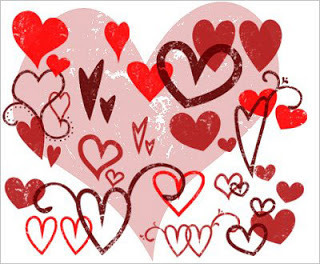 Dear Jess, on this Valentine's Day,
Dear Jess, on this Valentine's Day,
It is my honor and privilege to say,
That I hope you have the best year,
Full of creative endeavors and cheer.
Your photos, crafting and writing,
Will soon have everyone fighting,
For your pics, your scarves and your books,
(especially if they can't use crochet hooks).
Your Before They Were Published feature,
Shows you're a kind and generous creature.
Your love for the noble equine,
Proves you're pure of heart and mind,
So best wishes in all that you do,
May all of your writing dreams come true.
Happy Valentine's Day, everyone! Love is all around us . . . :)
I am no Keats, but it's Valentine's Day. I can get away with bad poetry, right? Despite my lack of skill, Jess, my wishes for you are sincere. Have a great day!
 Dear Jess, on this Valentine's Day,
Dear Jess, on this Valentine's Day,It is my honor and privilege to say,
That I hope you have the best year,
Full of creative endeavors and cheer.
Your photos, crafting and writing,
Will soon have everyone fighting,
For your pics, your scarves and your books,
(especially if they can't use crochet hooks).
Your Before They Were Published feature,
Shows you're a kind and generous creature.
Your love for the noble equine,
Proves you're pure of heart and mind,
So best wishes in all that you do,
May all of your writing dreams come true.
Happy Valentine's Day, everyone! Love is all around us . . . :)
Published on February 13, 2011 23:15
February 9, 2011
Road Trip Wednesday: Love is in the Air
Ah, Valentine's Day. Doily cards and Sweetart Hearts and champagne and roses. And the YA Blogosphere Lovefest, of course. Have you signed up? Today's the last day to sign up!
Valentine's Day also makes us wonder about our favorite literary couples (wha? that was a huge leap?) and YA Highway's RTW asks: Who are your favorite literary couples?
This is easy.
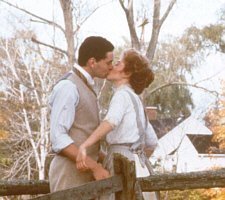 FINALLY she says yes. Take forever much?Anne and Gilbert: I love their story in the books. He's loved her since she whacked him over the head with her slate because he called her carrots. She realized how much she loved him when she thought he was going to die. In the movie, every time he first proposes to her I scream at the T.V.: "SAY YES THIS TIME!!!" And I really do hope that, this time, she will. She never does. :( But tragedy inspires soul-searching and the two do live happily ever after.
FINALLY she says yes. Take forever much?Anne and Gilbert: I love their story in the books. He's loved her since she whacked him over the head with her slate because he called her carrots. She realized how much she loved him when she thought he was going to die. In the movie, every time he first proposes to her I scream at the T.V.: "SAY YES THIS TIME!!!" And I really do hope that, this time, she will. She never does. :( But tragedy inspires soul-searching and the two do live happily ever after.
Taylor Markham and Jonah Griggs: They're supposed to be territorial enemies, but these two students share a secret--and a past--no one knows about. And they can't leave it behind. They're both complex characters but I especially love Jonah's persistence when it comes to Taylor
Honorable mentions: Emma Woodhouse and Mr. Knightly; Hermione and Viktor Krum (what?); Daisy and Edmond (How I Live Now).
Who are your favorites? Visit YAH to play along with RTW.
Valentine's Day also makes us wonder about our favorite literary couples (wha? that was a huge leap?) and YA Highway's RTW asks: Who are your favorite literary couples?
This is easy.
 FINALLY she says yes. Take forever much?Anne and Gilbert: I love their story in the books. He's loved her since she whacked him over the head with her slate because he called her carrots. She realized how much she loved him when she thought he was going to die. In the movie, every time he first proposes to her I scream at the T.V.: "SAY YES THIS TIME!!!" And I really do hope that, this time, she will. She never does. :( But tragedy inspires soul-searching and the two do live happily ever after.
FINALLY she says yes. Take forever much?Anne and Gilbert: I love their story in the books. He's loved her since she whacked him over the head with her slate because he called her carrots. She realized how much she loved him when she thought he was going to die. In the movie, every time he first proposes to her I scream at the T.V.: "SAY YES THIS TIME!!!" And I really do hope that, this time, she will. She never does. :( But tragedy inspires soul-searching and the two do live happily ever after.Taylor Markham and Jonah Griggs: They're supposed to be territorial enemies, but these two students share a secret--and a past--no one knows about. And they can't leave it behind. They're both complex characters but I especially love Jonah's persistence when it comes to Taylor
Honorable mentions: Emma Woodhouse and Mr. Knightly; Hermione and Viktor Krum (what?); Daisy and Edmond (How I Live Now).
Who are your favorites? Visit YAH to play along with RTW.
Published on February 09, 2011 09:38
February 5, 2011
YA Blogosphere V-Day LOVEFEST!
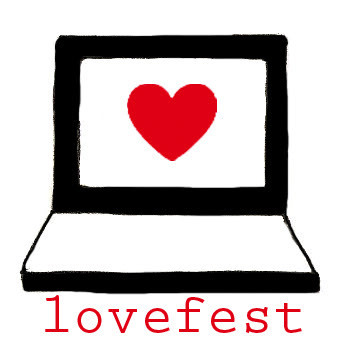 Give me your tired, your poor, your huddled masses waiting for the valentines in the mail/the flowery delivery dude/the secret crush on the 48th floor to ask you to dinner. Give them ALL TO MEEEE!!!
Give me your tired, your poor, your huddled masses waiting for the valentines in the mail/the flowery delivery dude/the secret crush on the 48th floor to ask you to dinner. Give them ALL TO MEEEE!!!And you come to, yes?
That holy day of red, pink and (dare I say?) puke* is almost upon us and as Kate, Sarah, Tahereh and I were musing about whether the enormity of love Dobby has for socks is possible for the human race to truly conceive, we were struck with an idea. Let's throw a Valentine's Day lovefest for all our favorite blogger pals!
That would be you. :D
Be a sweetheart and join us, won't you? There are three things you should do to participate:
1. Sign up for the Valentine's blog exchange. Head over to Kate Hart's blog and fill in her handy-dandy, easy-peasy form (everyone who participates must have a blog). Once entries are closed on February 9th, we will randomly assign each person a secret V-day admirer. Once you have your assignment, construct a blog post extolling the wonderful virtues of your Valentine. Don't know the person you were assigned? Read their blog, strike up a convo on twitter . . . do whatever it takes to be the best secret admirer you can be! (Don't be creepy.) You never know, you just might make a new friend in the process. :) On V-day, publish your blog post and link to your Valentine so s/he can drop in and read it. Insta good feelings all around!
2. Get your participant badge from Sarah Enni's blog. It's exactly like the one above and marks you as a loving, generous soul suitable for Nobel Prize nomination. And for the last plastic-heart decorated cupcake in the break room.
3. Join us for live blog movie time on Sunday, February 13th! We're gonna stay in, hang out, make popcorn mixed with sweetart candy hearts and red and white almond m&ms (seriously, sooo good) and chat and watch a movie with YOU! Drop in at Tahereh's blog for all the mushy movie details!
What are you waiting for? Dust off your craft table, open the jars of glitter and dive into YA Blogosphere Lovefest!
*Haha, just kidding. I'm not really that cynical on Saturdays.
Published on February 05, 2011 21:59
February 3, 2011
Travel + Writing
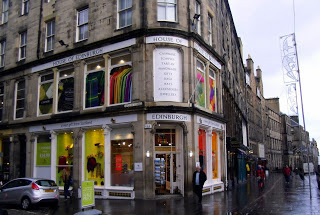 Colorful EdinburghI know. It's been a super long time since I've posted. My go-to explanation is that I've been busy! but I hate how flaky that sounds and, really, aren't we all busy? But I have been traveling, working hard, moving on up (more on that very soon--promise) and getting ready for music festival season/MLS season/Baseball season, etc. I know those things are still months away, but a girl's gotta plan. :)
Colorful EdinburghI know. It's been a super long time since I've posted. My go-to explanation is that I've been busy! but I hate how flaky that sounds and, really, aren't we all busy? But I have been traveling, working hard, moving on up (more on that very soon--promise) and getting ready for music festival season/MLS season/Baseball season, etc. I know those things are still months away, but a girl's gotta plan. :) Moody Loch LomondAs for travel, I took three weeks and headed to Europe over the winter holidays. I saw some old friends, made loads of new friends and had a blast. When I got home, a couple of people asked how/if my traveling inspired my writing in any way. I actually did not write a single word while I was gone. But! The experiences I had, the things I saw, the people I met . . . all of these things will influence my writing somehow.
Moody Loch LomondAs for travel, I took three weeks and headed to Europe over the winter holidays. I saw some old friends, made loads of new friends and had a blast. When I got home, a couple of people asked how/if my traveling inspired my writing in any way. I actually did not write a single word while I was gone. But! The experiences I had, the things I saw, the people I met . . . all of these things will influence my writing somehow.Here are some highlights of my trip:
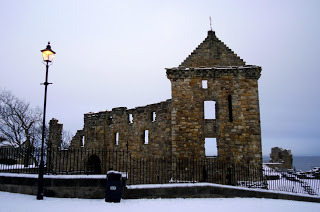 Ruins at St. Andrews The people. I met the most amazing new people while in Eastern Europe. Budapest was spent in the company of another solo traveler from San Antonia by way of Mexico. Krakow was an explosion of new friends, from locals who cooked New Year's dinner for me and some friends to Crazy Germans who danced until the crack of dawn with me to Amazing Aussies who carried my bag and shared a cup of ultra-thick hot chocolate with me. It's hard to say how the people will influence my writing, but I've expanded myself by knowing them, knowing their traditions and dreams, how they struggle, how they enjoy life.
Ruins at St. Andrews The people. I met the most amazing new people while in Eastern Europe. Budapest was spent in the company of another solo traveler from San Antonia by way of Mexico. Krakow was an explosion of new friends, from locals who cooked New Year's dinner for me and some friends to Crazy Germans who danced until the crack of dawn with me to Amazing Aussies who carried my bag and shared a cup of ultra-thick hot chocolate with me. It's hard to say how the people will influence my writing, but I've expanded myself by knowing them, knowing their traditions and dreams, how they struggle, how they enjoy life.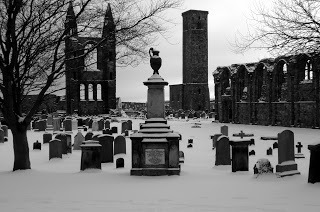 St. Andrew's Cathedral cemetery
St. Andrew's Cathedral cemetery 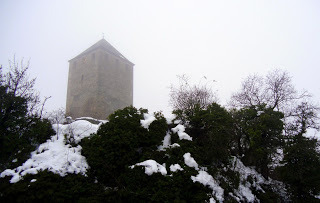 German castle rising above the mist
German castle rising above the mist
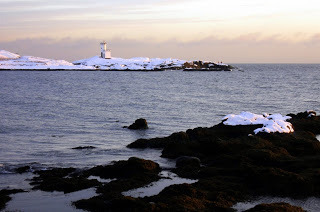 Elie, Fife, Scotland
Elie, Fife, Scotland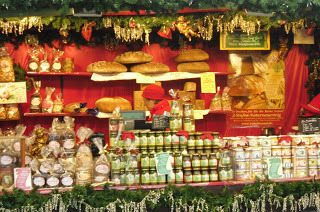 Stall at the Mannheim Christmas market
Stall at the Mannheim Christmas market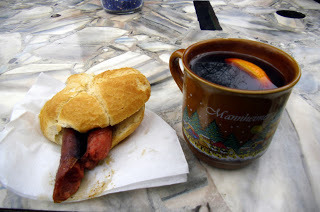 Sausage and Gluwein in Germany
Sausage and Gluwein in Germany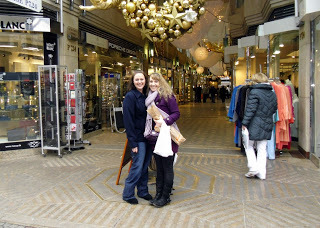 The people!!! With bestie Amanda
The people!!! With bestie Amanda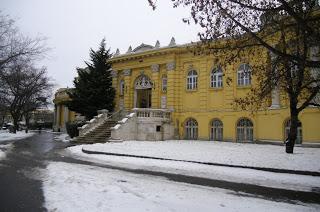 Szechenyi thermal baths, Budapest
Szechenyi thermal baths, BudapestThe setting. This was the most obvious influence for me. The armory at Wawel Castle in Krakow; the winding streets and pastel structures in Prague; the creepy cemetery and crumbling ruins in St. Andrews, Scotland; the misty castles of Germany. Even if I never set a novel in these cities, I will always have a vision in my mind of what a stoic castle towering out of mist looks like in real life or what a striking picture a violinist against the peeling paint of an ancient wall makes.
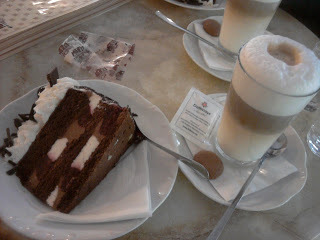 Pre-opera treats in a Budapest cafe
Pre-opera treats in a Budapest cafe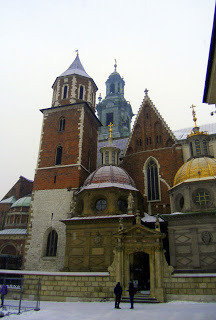 Wawel Cathedral, Krakow, Poland
Wawel Cathedral, Krakow, Poland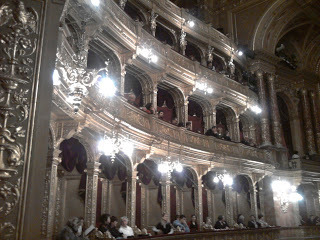 Budapest State Opera House
Budapest State Opera House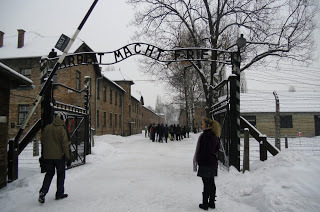 "Work will set you free"
"Work will set you free"
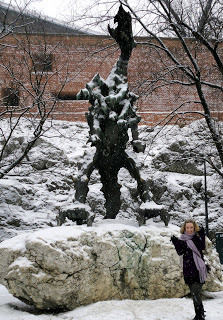 Krakow's famous scary dragon x 2
Krakow's famous scary dragon x 2
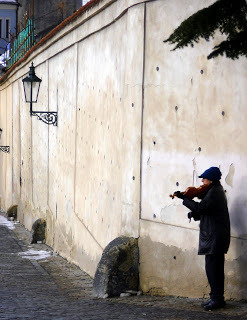 Street musician in PragueThe emotion. My travels were full of highs and lows. New romance and seeing a best friend I'd never met in person before were highs. Visiting Auschwitz and Birkenau Concentration Camps were a suckerpunch low I will never forget and an experience I still can't quite put into words. New Year's Eve fireworks in a city I'd come to love very quickly and the tastes and textures of new and beloved foods were highs. Being alone in a new city by myself, wondering how long before I'd meet someone to hang out with was a low. The things I felt over the course of three weeks ran the emotion-meter gamut and my characters will have more depth because of it.
Street musician in PragueThe emotion. My travels were full of highs and lows. New romance and seeing a best friend I'd never met in person before were highs. Visiting Auschwitz and Birkenau Concentration Camps were a suckerpunch low I will never forget and an experience I still can't quite put into words. New Year's Eve fireworks in a city I'd come to love very quickly and the tastes and textures of new and beloved foods were highs. Being alone in a new city by myself, wondering how long before I'd meet someone to hang out with was a low. The things I felt over the course of three weeks ran the emotion-meter gamut and my characters will have more depth because of it.
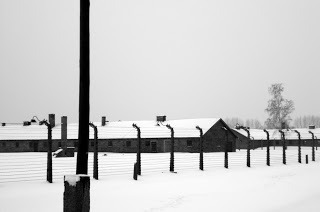 The stark reality of Birkenau Death Camp
The stark reality of Birkenau Death Camp
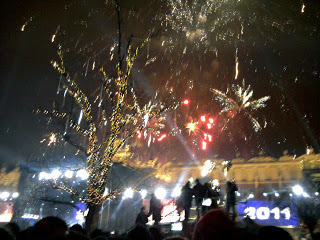 New Year's Eve in a new city
New Year's Eve in a new city
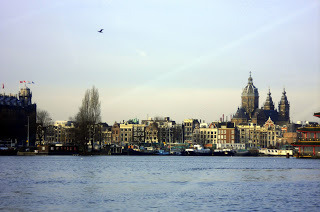 Amsterdam Harbor
Amsterdam HarborHow have your travels influenced your writing?
Published on February 03, 2011 22:28



